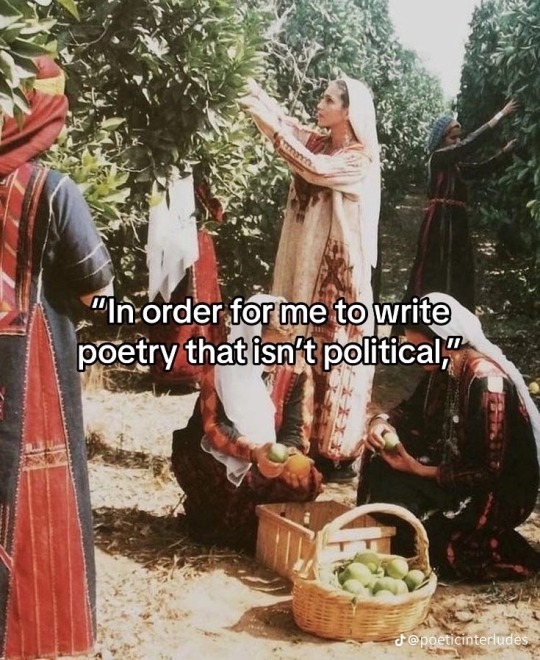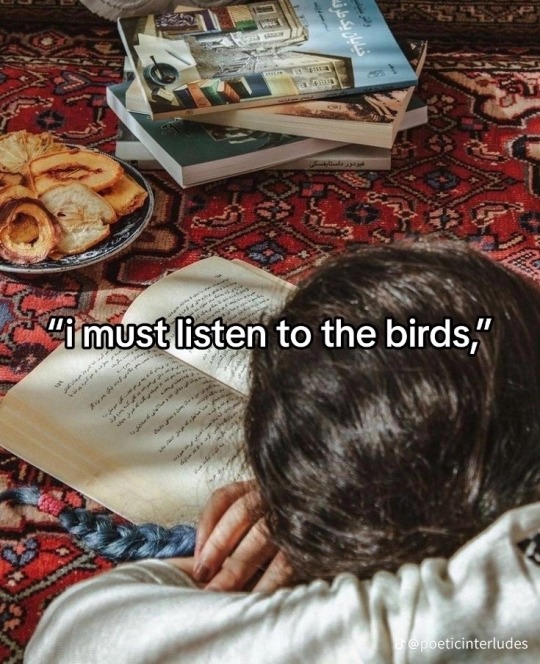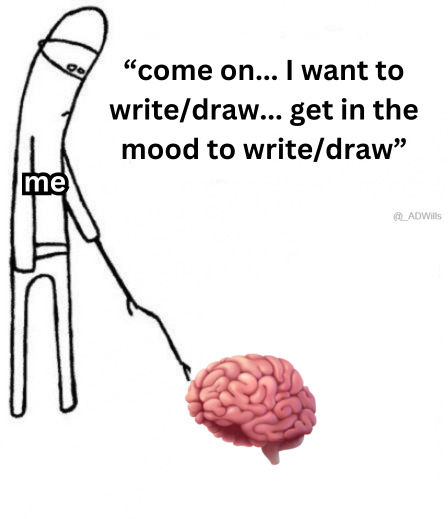Text
How to Write Your Own Spells
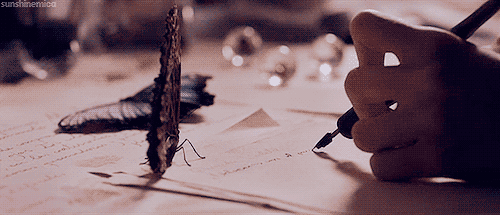
There are lots of ways to create spells, from planning everything to the minutest detail ahead of time to absolutely flying by the seat of your pants in the moment. If you'd like to write your own spells, either for use in your craft or as a creative exercise, here are some suggested steps that I use in my own practice:
1) Determine the intent or goal of your spell. Decide, first and foremost, what you want the spell to do. Refine your goal if necessary and try not to be too nebulous. Your intent tells the spell what it's meant to do. A more focused goal may increase the chances of success.
2) Determine how you want the spell to manifest. Decide how the spell should work and what the result should look like. This is a good time to build in a sign of success, especially for spells that may not work in an obvious or visible way.
3) Determine what or whom the spell will affect. If the spell is to have a target, be it a person or a place or an animal or an object, decide what that should be and how they or it will be represented in the casting.
4) Determine how long the spell is meant to work. If your spell is timebound or has a deadline, decide what that will be. If the spell is meant to work long-term, you may want to check in and refresh it from time to time. (Not every spell will be timebound. Many spells will simply expire when they have fulfilled their purpose or if they are blocked or circumstances are not favorable.)
5) Determine the timing of the spell, if applicable. Not everyone uses celestial or astrological timing for their spells, but if you do, look into the prevailing conditions and decide on an advantageous time for your casting. (Please note that magical timing can only enhance your spell and casting something on the "wrong" day will not necessarily cause it to fail.)
6) Determine what methods and materials you want to use to cast the spell. Decide how you're going to go about performing the casting, whether you're doing a ritual or making a charm or just using energy. If you're going to need a ritual space or physical components, plan that out and make sure it fits with what you want to do.
7) Determine the words, if any, which will empower the spell. If you want to include a prayer or a petition or a song or an incantation with your spell, decide what that should be. This is not strictly necessary and the words need not be spoken aloud. (Rhyming incantations are not required, but if you prefer them that way, you can certainly do so.)
8) Prepare the materials for casting the spell. Get all your necessaries together ahead of time. Make sure you have everything you need, that tools and components are in good and useable condition, prepare your workspace, and make sure everything is within easy reach so you don't have to stop and search for things in the middle of your casting. (And for goodness sake, if you're working with open flame, observe fire safety and tie your hair and sleeves back.)
9) Finalize details and perform the casting. When you're ready to begin, try to eliminate as many possibilities for distraction or interruption as possible. Go over your spell and components one more time, then proceed with casting the spell.
10) Record the particulars for future reference and to determine how well the spell worked. Make a record of the spell, including your goal, how it should manifest, the words and components used, the date of the casting, the casting method and procedure, and how the casting went. If there are any additional details or observations that seem important, include those as well. This will serve as a useful learning tool in the future and will allow you to check your work if the results make themselves known.
It's useful to write spells from time to time if the inspiration strikes you, in order to better understand how they fit together and how they work. Plus it's a fun and creative journaling exercise and recording the spells you cast a great way to measure your progress later on.
For additional tips on writing your own spells and helpful tricks for using timing and available materials to your advantage, check out my podcast, Hex Positive, Eps. 006-007, "Come In For A Spell, pt 1 & 2."
(And if you’re enjoying my content, please feel free to drop a little something in the tip jar or check out my published works on Amazon or in the Willow Wings Witch Shop. 😊)
Happy Witching! 🔮✨
5K notes
·
View notes
Text
I really need a emergency reading please. Is there any tarot readers that can help me with a deity reading please? It's not do indentify anything, It's an emergency about one of my deities. Thank you.
#deity work#paganism#witchcraft#aine#deity worship#goddess áine#pagan witch#tarot#tarotcommunity#tarot reader#tarot reading#traditional witchcraft
1 note
·
View note
Text

A few additional and random sketches of Gale. I couldn't do more this week due to that whole art theft situation (I can't thank you enough for your help with this nightmare ❤️).
(sorry for the bad quality, most of them were pencil sketches I quickly lined and colored on csp)
2K notes
·
View notes
Text
How to show emotions
Part III
How to show disappointment
swallowing hard
low, monotone voice
clucking their tongue
rubbing their face
shaking head
clenching hands
sighing
frowning
pursing of the lips
slumped shoulders
looking away
scowling
How to show relief
exhaling deeply
tension in their face going away
closing eyes for a moment
tentative smile
eyes brightening up
small giddy laughter
putting hand on their breast
joyfully tearing up
looking up
How to show desire
gaze dropping down to the other's lips
opening mouth slightly
small smile around the eyes
eyes widening
pupils dilating
biting lips
following them with their eyes
inhaling deeply
licking lips
How to show tiredness
closing eyes
slowly opening them again
long sighs
yawning
no eye contact
head lolling to the side
closed mouth, neither smile nor scowl
not moving a lot
doing everything slower
staring off into the near distance
How to show confidence
prolonged eye contact
nodding to show they are listening
putting their shoulders back
holding head high
leaning forward
standing tall
smiling openly
Part I | Part II
If you like my blog and want to support me, you can buy me a coffee or become a member! And check out my Instagram! 🥰
14K notes
·
View notes
Text
seeking out physical affection
comparing hand-sizes to hold their hand against the other's and then just holding hands
leaning against the other one in close spaces
acting like they're cold to have an excuse to cuddle or share clothes or blankets
brushing a strand of hair away
grabbing each other's hands in crowds or when crossing the street to "be safe"
turning their cheek to get the other one to give them a peck
brushing their arm against the other's, hoping the other would finally catch their arm and hold it close
fixing the other's hairstyle to let their hands run through their partner's hair
draping the arm around their shoulder while sitting next to each other
lightly tickling the other one, almost hoping it gets retaliated
reaching out with their hand without saying anything, wanting the other one to grab it
linking arms when walking around together
trying to get the other to dance with them
bumping shoulders into each other
wrapping arms around the other's neck when standing behind them
19K notes
·
View notes
Text
☆Easy Witchcraft Hack ☆
You can use drinks from grocery stores as mini spells such as this one, which has...
Black Tea:
Magical Properties: Strength, courage, wealth, banishment, willpower, energy, stability, death, and alertness.
Green Tea:
Magical Properties: Healing, love, sexual health, energy, longevity, immortality and cleansing.
Kiwi fruit: fertility and protection
Strawberry fruit: purity, passion and healing

131 notes
·
View notes
Text
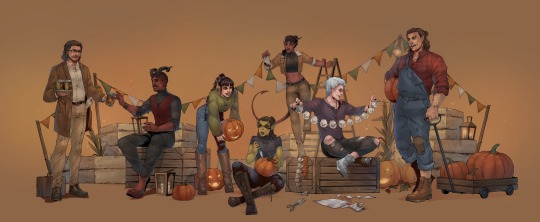

Something cozy and comforting for Halloween, they're almost ready. Are you? :3
9K notes
·
View notes
Text
Writing in the dark at 11:30pm just hits different man
the words just flow out
morning me could never
363 notes
·
View notes
Text
Body language that conveys embarrassment
1. Avoiding Eye Contact: People who are embarrassed may avoid making eye contact with others.
2. Self-Touching: They might fidget, touch their face, or adjust their clothing as a nervous habit.
3. Nervous Laughter: Some people may giggle or laugh nervously in an attempt to downplay their embarrassment.
4. Shifting Weight: Shifting weight from one foot to another or crossing and uncrossing legs can be a sign of discomfort.
5. Covering the Face: Using their hands to cover their face or mouth can be a subconscious attempt to hide embarrassment.
6. Reduced Speech: Embarrassed individuals may become more reserved and speak less.
7. Lowering Head or Hunched Shoulders: This can signify a desire to make themselves appear smaller or less noticeable.
8. Prolonged Silence: People may become unusually quiet when they feel embarrassed.
It's important to remember that these cues can vary from person to person, and not everyone will exhibit the same body language when embarrassed.
4K notes
·
View notes
Text
im trying to remind myself lately that writing doesn't have to just mean writing a book. i can write random stuff that i never have to look at again !! i can make up characters and abandon them without feeling guilty !! i do not need to be creating an 'end result' to enjoy this hobby !!!!!!!!!!
4K notes
·
View notes
Text
Writing is about following your imagination. Writing is about having fun. Writing is about self discovery and self expression. You can write anything you want. Allow your story to unfold.
463 notes
·
View notes
Text
Hey! Are there blacksmiths in your story? I'm a hobbyist blacksmith and I'm here to help!
Blacksmithing is one of those things that a lot of people get wrong because they don't realize it stuck around past the advent of the assembly line. Here's a list of some common misconceptions I see and what to do instead!
Not all blacksmiths are gigantic terrifying muscly guys with beards and deep voices. I am 5'8, skinny as a twig, have the muscle mass of wet bread, and exist on Tumblr. Anybody who is strong enough to pick up a hammer and understands fire safety can be a blacksmith.
You can make more than just swords with blacksmithing. Though swords are undeniably practical, they're not the only things that can be made. I've made candle holders, wall hooks, kebab skewers, fire pokers, and more. Look up things other people have made, it's really amazing what can be done.
"Red-hot" is actually not that hot by blacksmith terms. when heated up, the metal goes from black, to red, to orange, to yellow, to white. (for temperature reference, I got a second degree burn from picking up a piece of metal on black heat) The ideal color to work with the metal is yellow. White is not ideal at all, because the metal starts sparking and gets all weird and lumpy when it cools. (At no point in this process does the metal get even close to melting. It gets soft enough to work with, but I have never once seen metal become a liquid.)
Blacksmithing takes fucking forever. Not even taking into account starting the forge, selecting and preparing metal, etc. etc. it takes me around an hour to make one (1) fancy skewer. The metals blacksmiths work with heat up and cool down incredibly fast. When the forge is going good, it only takes like 20 seconds to get your metal hot enough to work with, but it takes about the same time for it to cool down, sometimes even less.
As long as you are careful, it is actually stupidly easy to not get hurt while blacksmithing. When I picked up this hobby I was like "okay, cool! I'm gonna make stuff, and I'm gonna end up in the hospital at some point!" Thus far, the latter has yet to occur. I've been doing this for nearly a year. I have earned myself a new scar from the aforementioned second degree burn, and one singe mark on my jeans. I don't even wear gloves half the time. Literally just eye protection, common sense, and fast reflexes and you'll probably be fine. (Accidents still happen of course, but I have found adequate safety weirdly easy to achieve with this hobby)
A forge is not a fire. The forge is the thing blacksmiths put their metal in to heat it up. It starts as a small fire, usually with newspaper or something else that's relatively small and burns easily, which we then put in the forge itself, which is sort of a fireplace-esque thing (there's a lot of different types of forge, look into it and try to figure out what sort of forge would make the most sense for the context you're writing about) and we cover it with coal, which then catches fire and heats up. The forge gets really hot, and sometimes really bright. Sometimes when I stare at the forge for too long it's like staring into the sun. The forge is also not a waterfall of lava, Steven Universe. It doesn't work like that, Steven Universe.
Welding and blacksmithing are not the same thing. They often go hand-in-hand, but you cannot connected two pieces of metal with traditional blacksmithing alone. There is something called forge welding, where you heat your metal, sprinkle borax (or the in-universe equivalent) on it to prevent the metal from oxidizing/being non-weldable, and hammer the pieces together very quickly. Forge welding also sends sparks flying everywhere, and if you're working in a small space with other blacksmiths, you usually want to announce that you're welding before you do, so that everyone in a five-foot radius can get out of that five-foot radius. You also cannot just stuck some random pebbles into the forge and get a decent piece of metal that you can actually make something with, Steven Universe. It doesn't work like that, Steven Universe.
Anvils are really fucking heavy. Nothing else to add here.
Making jewelry is not a blacksmithing thing unless you want jewelry made of steel. And it will be very ugly if you try. Blacksmithing wasn't invented to make small things.
If there's anything here I didn't mention, just ask and I'll do my best to answer.
38K notes
·
View notes
Note
Any tips on how to write a character that holds grudges?
From the icy walls they erect to their unquenchable thirst for revenge, characters who carry a grudge can push a narrative into unexpected territories. So let’s explore how to write characters who hold a grudge!
Behaviour
Isolate themselves
Passive-aggressive
Obsessively focused
Delayed responses
Overly critical
Extreme reactions to the subject of their grudge
Avoid situations in which the grudge can surface
Deep-seated resentment
Struggle to let things go
Retaliatory actions
Interactions
Cold or curt manner
Avoiding direct communication with the subject of their grudge
Use sarcasm, irony, or veiled hostility
Use others as proxies for communication
Use formal language
Harsh tone
Active avoidance
Behave counter to the wishes of the subject of their grudge
React negatively to attempts at reconciliation
Body language
Stiff posture
Avoid eye contact
Crossed armos
Expressions of distaste
Turning away and shunning
Maintain physical distance
Grimacing
Dismissive gestures
Tension and crossed arms or legs
Clenched teeth
Attitude
Stubborn and unyielding
Unwilling to forgive and forget
A sense of entitlement
Bitter or cynical
A lack of empathy
Reluctance to let go of the past
Righteous anger
Unwilling to compromise
Feel wronged or victimised
A push to “get even”
Positive story outcomes
A grudge has the potential to foster forgiveness and reconciliation, serving as a powerful catalyst for personal growth. In time, the grudge-holder may come to realise their own mistakes and seek to make amends, leading to a profound understanding of the offender’s perspective. Ultimately, through this transformative journey, they may find the strength to let go of their grudge, providing a sense of relief and closure.
Negative story outcomes
Holding on to a grudge has the potential to inflict permanent damage on relationships, creating rifts that may never fully heal. The weight of the grudge can bring about unnecessary stress and mental anguish, consuming the grudge-holder’s thoughts and emotions. This can lead to a cycle of further conflicts and misunderstandings, pushing away valuable relationships that could have brought joy and fulfilment. In the grip of a grudge, a character may lose sight of what truly matters, becoming consumed by their resentment and losing the ability to appreciate the present.
Helpful synonyms
Resentment
Bitterness
Animosity
Hostility
Rancor
Enmity
Ill will
Antipathy
Antagonism
Hatred
Spite
Ill feeling
Bad blood
Malice
Vendetta
Animus
Malcontent
Petulant
Vindictive
Peevish
344 notes
·
View notes


